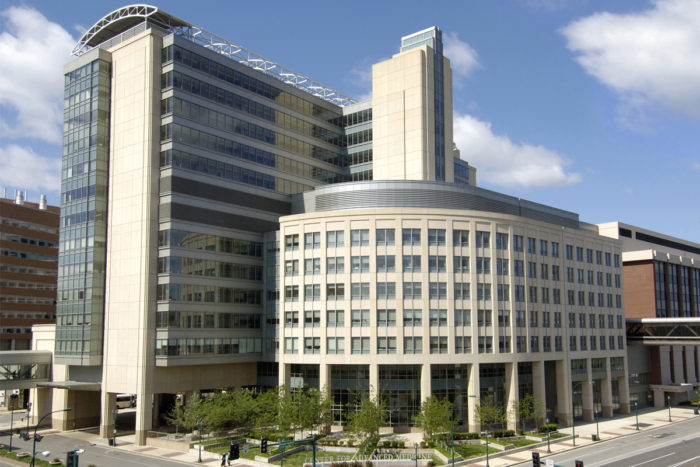Extensive clinical trials program offers hope, advances care
The Alvin J. Siteman Cancer Center provides patients with a wide array of clinical trials that seek to prevent, diagnose and treat cancer

The Alvin J. Siteman Cancer Center at Barnes-Jewish Hospital and Washington University School of Medicine operates one of the nation’s largest clinical trial programs, offering patients the latest investigational treatments and the opportunity to play a vital role in advancing future medical care.
Each year, Siteman physicians provide care to roughly 38,000 patients — 8,700 of them newly diagnosed. These patients have access to approximately 350 therapeutic clinical trials and 450 non-therapeutic trials. Therapeutic trials offer treatment, while non-therapeutic trials involve things such as diagnostic imaging, specimen collection or quality-of-life measures.
“We cover the whole gamut, with therapeutic and non-therapeutic trials in all critical areas of cancer care,” says Nick Fisher, Siteman’s director of clinical research. “Siteman has a strong commitment to advancing care through research, and we have a large physician group with extensive expertise. All of that is an advantage for the patient.”
High patient participation
High patient participation is a hallmark of the program; just over 30 percent of Siteman patients participate in interventional clinical trials, a rate that is among the highest in the country. Interventional trials include studies of diagnostic tests, therapies or behavioral modifications, among other things.
Why such a high participation rate? In part, because cancer patients are among the most altruistic of all clinical trial participants, says Siteman director and breast cancer surgeon Timothy Eberlein, MD; although many patients can benefit personally from participation, the desire to help those that follow is strong.
“Many of our patients who enroll in clinical trials tell us, ‘I’m not doing this just for me. I’m doing this for my children and for my grandchildren,” says Fisher.
Access to the latest treatments
In addition, clinical trials provide access to the very latest investigational treatments, many of which are only available at a few select sites around the country.
“If a patient has aggressive cancer, we know the standard treatment may not be successful. For these patients, clinical trials can be the best option,” says Fisher.
The program’s success also stems from Washington University School of Medicine’s overall strength in research, says Fisher. Siteman excels in translational research — multidisciplinary work aimed at translating laboratory discoveries into clinical solutions. The ultimate goal is to foster development of individualized treatment for cancer and other diseases.
Areas of clinical research focus include:
- Genomics — testing the DNA of patients and their tumors to understand why cancer develops and to predict whether patients will respond to certain treatments. Advances so far include identifying virtually all major mutations that drive acute myeloid leukemia (AML); mapping many of the genetic mutations in the most common form of lung cancer, and showing that a deadly subtype of breast cancer is genetically more similar to ovarian tumors than to other breast cancers, indicating that cancer treatments may be more effective if based on genetic profile rather than location.
- Radiation oncology — developing and evaluating new methods for delivering radiation therapy and setting national standards for care. Washington University researchers have led development of 3-dimensional treatment planning, intensity-modulated radiotherapy, proton beam therapy, and other technologies aimed at delivering safer, more precise therapy.
- Medical oncology, leukemia and lymphoma — offering one of the world’s largest bone marrow and stem cell transplant programs, including more than 40 therapeutic clinical trials for leukemia, lymphoma, multiple myeloma and related disorders. Studies have led to major advances in transplantation and to identifying better chemotherapy agents.
- Imaging — creating safer and more precise methods for cancer diagnosis. Washington University’s Mallinckrodt Institute of Radiology is among the world’s largest radiology research centers, actively involved in developing and testing new technologies. The school’s Clinical Imaging Research Center offers comprehensive imaging technology fully dedicated to research and located within Barnes-Jewish Hospital for patients’ convenience.
- Prevention — understanding barriers to care; identifying and evaluating strategies for cancer prevention and communication of health information. Siteman’s Program for the Elimination of Cancer Disparities aims to create a national model for reducing local and regional inequalities in cancer education, prevention and treatment.
If you are interested in a clinical trial, discuss the possibility with your physician. Any cancer patient may be referred to Siteman to determine whether there is a trial that is right for you. If you are eligible and choose to participate, your cancer care will take place at Siteman, and your care providers will maintain close communication with your referring physician.






